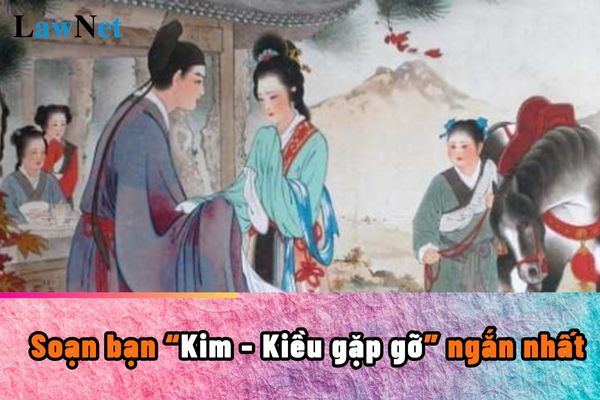What are guidelines on preparing the lesson "Kim Kiều gặp gỡ" for students in Vietnam? What literary materials are required to achieve after completing grade 9 Literature in Vietnam?
What are guidelines on preparing the lesson "Kim Kiều gặp gỡ" for students in Vietnam?
The text "Kim Kiều gặp gỡ" is an excerpt from Truyện Kiều (Nguyễn Du) that students will learn in the grade 9 Literature program.
Students can refer to the following guidelines on preparing the lesson "Kim Kiều gặp gỡ":
|
Guidelines on preparing the lesson "Kim Kiều gặp gỡ" * Main content of the lesson: |
Note: Information about the lesson "Kim Kiều gặp gỡ" is for reference only./.

What are guidelines on preparing the lesson "Kim Kiều gặp gỡ" for students in Vietnam? What literary materials are required to achieve after completing grade 9 Literature in Vietnam? (Image from Internet)
Is it necessary to ensure objectivity when assessing grade 9 students in Vietnam?
Based on Article 4 of Circular 22/2021/TT-BGDDT, the requirements for assessing grade 9 students include:
- Assessing based on the required achievements specified in the General Education Program.
- Ensuring the assessment is accurate, comprehensive, fair, honest, and objective.
- Employing various methods, forms, techniques, and tools for assessment; combining regular and periodic assessments.
- Assessing for students' progress; emphasizing encouragement and motivation for students' efforts in training and studying; not comparing students with each other.
The requirements specify that the assessment of grade 9 students must ensure objectivity.
Read more: How to outline a creative storytelling essay for grade 5 Vietnamese?
Read more: How to outline a landscape description essay for grade 5 students in Vietnam?
Read more: How to outline an essay describing a family member for students in Vietnam?
Read more: 3 steps to outline a creative storytelling essay for students in Vietnam
What literary materials are required to achieve after completing grade 9 Literature in Vietnam?
Based on the General Education Program issued with Circular 32/2018/TT-BGDDT, the necessary literary knowledge after completing Grade 9 Literature is as follows:
* Literature
- Literary knowledge streams
+ Literary theory: some practical issues of literary theory, related to understanding literary texts.
+ Literary genres: story, poetry, drama, memoirs, and some typical genres.
+ Elements of literary texts: plot, storyline, characters, space, time, narrator, point of view, rhyme, rhythm,...
+ Literary history: some major authors and general features of Vietnamese literary history summarized at the end of lower secondary school and upper secondary school levels.
- Distribution of literary knowledge streams by grade level
+ Primary level: basic understanding of stories and poetry, fictional and non-fictional texts; characters in literary texts, plot, time, space, words, rhyme, rhythm, images, character dialogues.
+ Lower secondary school level: understanding of genres (folktales, short stories, lyrical and narrative poems; lyrical and narrative memoirs; novels and Nom narrative poems, formal and free verse poetry, tragedy and comedy); lyrical subjects and lyrical characters; the expressive, cognitive value of literary works; some formal elements and artistic techniques in literary genres (narrator, first-person narrator, third-person narrator, characters, point of view, changes in the narrator and point of view, conflict, space and time, narrator's words and characters' words, lyrical emotions, words, images, rhyme, rhythm, poetic structure); a brief summary of literary history by the end of Grade 9.
+ Upper secondary school level: understanding less common genres and sub-genres that require higher reading skills (myths, epics, traditional theater genres like Cheo or Tuong, modern stories and poems; modern and post-modern novels); some practical knowledge of literary history and theory applied to reading and writing literary texts (stories, omniscient narrators, limited narrators, narrators and perspective shifts, story-telling techniques, poetic ideas, literary imagery characteristics; literary style; understanding of literary history and prominent authors); some specialized topics focusing on the knowledge of literary periods, movements, and writing styles.

